Are you abiding by Delaware dog laws and etiquette? Tricks Fido may need to forget
Having a pet sounds like a walk in the dog park, but just like humans, they come with their own set of rules and restrictions to ensure smooth sailing for other human and furry friends alike.
“Homeward Bound” and “101 Dalmatians” might have you believing dogs can run amok around town and live a lawless life, but the real world has other plans in store.
Here is a look at both proper dog etiquette and existing laws that pertain to dogs and their humans alike.
Dog etiquette for pet owners

If you have a dog, chances are you already know the unspoken rules among the pet community about what it means to be considerate pet owner and how to instill good habits in your dog.
While these tips aren’t exactly laws, they’re good advice to heed to ensure your precious pup doesn’t become a neighborhood nuisance.
Dogs at home
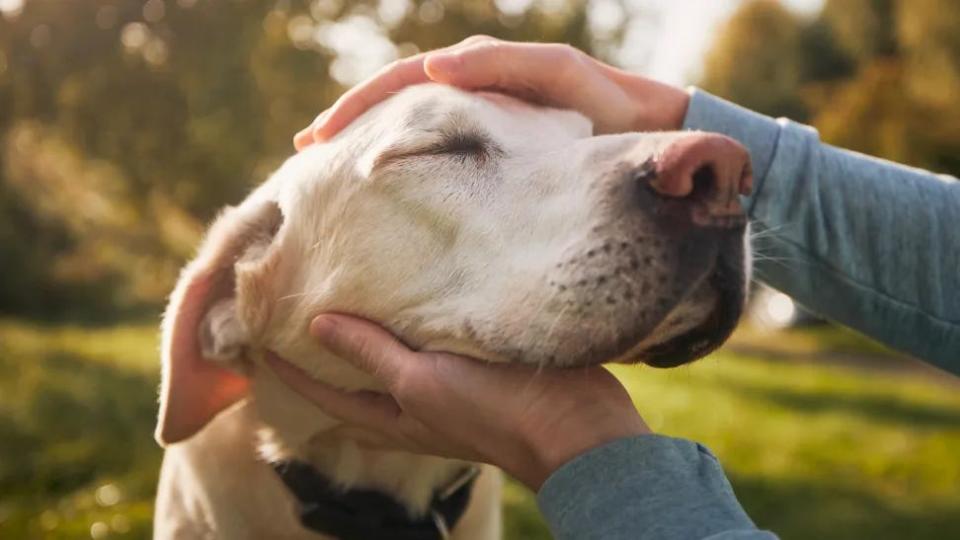
Most of us probably have encountered a jumping dog when walking into the home of a friend or relative. Although the excitement is flattering, it also can be dangerous if the pup scratches anyone or accidentally knocks over children or older adults.
The American Kennel Club recommends teaching your dog to sit when greeting others to avoid this and create a calmer, more welcoming environment for guests.
And while those guests are over, make sure you’ve trained your dog not to beg for scraps at the table. You can teach your pet to go to a designated area while you eat or crate them during mealtime.
During backyard time, make sure your yard is fenced in and that your dog can’t dig under it. This not only helps protect your pet from other animals and keeps them from wandering, but also ensures your pups don’t get into your neighbor’s prized flowerbed or vegetable garden.
Dogs in public
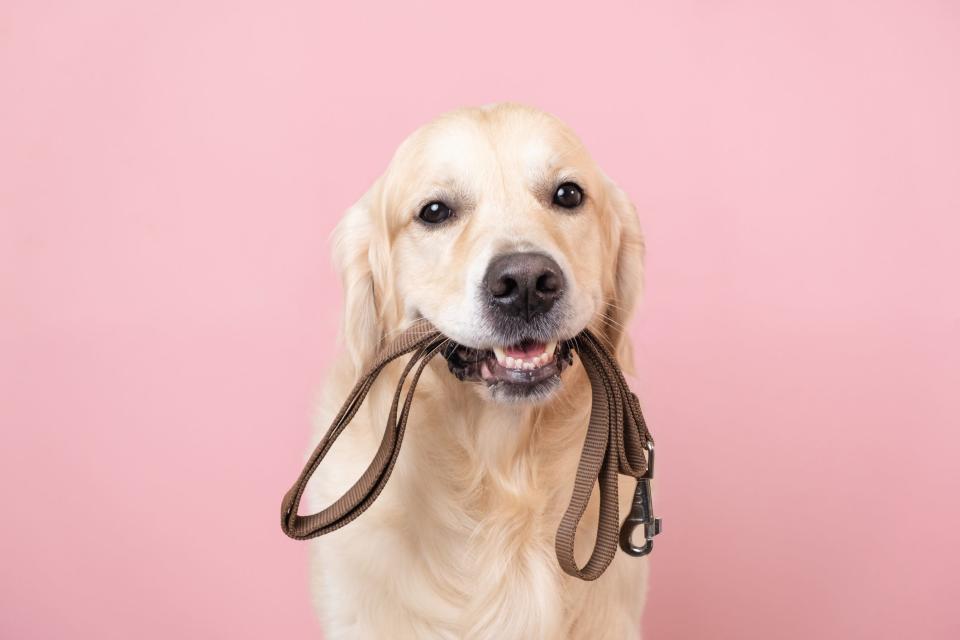
When you’re out in public with your dog, there are many ways you two can enjoy some time out while remaining respectful to other community members.
One of the main ways to do this is by picking up your dog’s poop.
We’ve had all those moments of regret after realizing we accidentally stepped in dog poop in our new kicks or summer sandals, but we can end this unfortunate incident for all by making sure we clean up after our pups do their business.
Always bring doggie bags when walking your pets, and if you run out or accidentally forget, come back as soon as you can to clean it up.
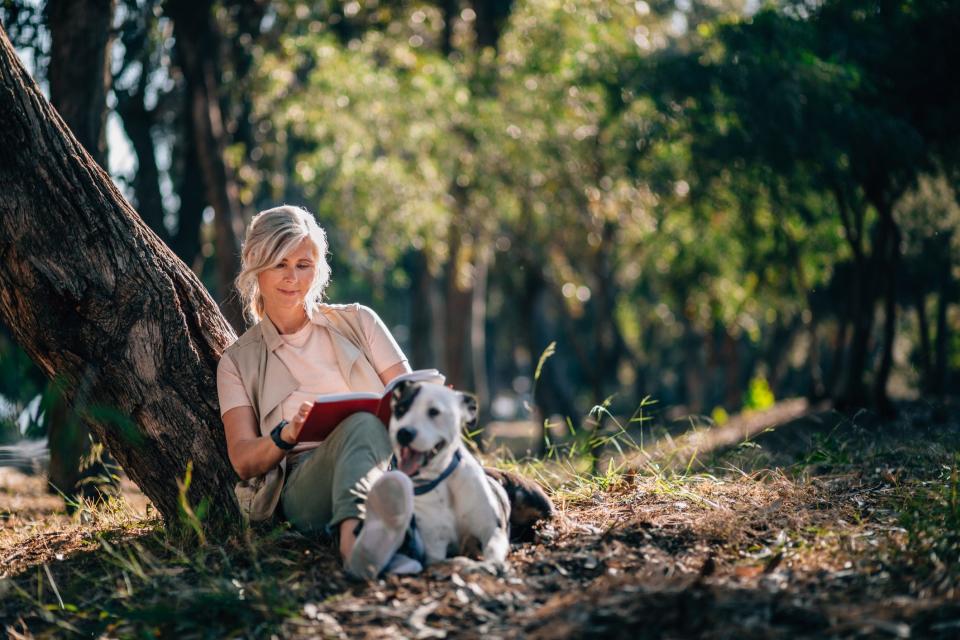
While on the topic of potty breaks, don’t let your dog traipse all over other people’s property and pee on their greenery. Your neighbors with green thumbs will appreciate the courtesy.
More ways to practice doggie etiquette, according to the Animal Humane Society, include:
Keep your dog leashed in parks and on walks unless off-leash activities are allowed. This is the law in many states, but also shows good manners, even if you think your dog is the sweetest angel there ever was. By the way, don’t let your dog play with other dogs while on leash. This can result in an injury or train your dog to think that all pets on leashes enjoy playful interactions.
Keep your dog close when you pass others. Leashes can become a tripping hazard if you allow your dog to have too much slack. Allowing your dog to roam far away also can pose a hazard if someone you pass is afraid of pets or has a dog with reactivity or anxiety issues.
Ask permission before allowing your dog to greet others. Not everyone is pet-friendly or has a dog that plays well with others. Be sure to check before introducing your pet to new people and animals.
Take your dog for a potty break before you go out. This will help prevent accidents and marking behavior at your favorite restaurant patio. While you’re at it, exercising your dog before any local outings will ensure it’s more relaxed and better behaved at the venue.
Prevent your dog from barking at other people or dogs. Practice getting your pet’s attention to redirect them if they begin barking at bystanders.
Be aware of other people’s feelings. If your dog does something to upset another person while out and about, like jumping on them or their dog, apologize and employ corrective techniques to prevent the situation from reoccurring.
Delaware dog laws

Pet owners in Delaware are expected to abide by a series of rules and regulations aimed at ensuring a safe and healthy environment is maintained for pets, pets are handled in an orderly way when in public, and pet abuse or instances of pet misbehavior are punishable by law.
Here some dog laws in Delaware as noted in the Delaware Code:
Dog shelters
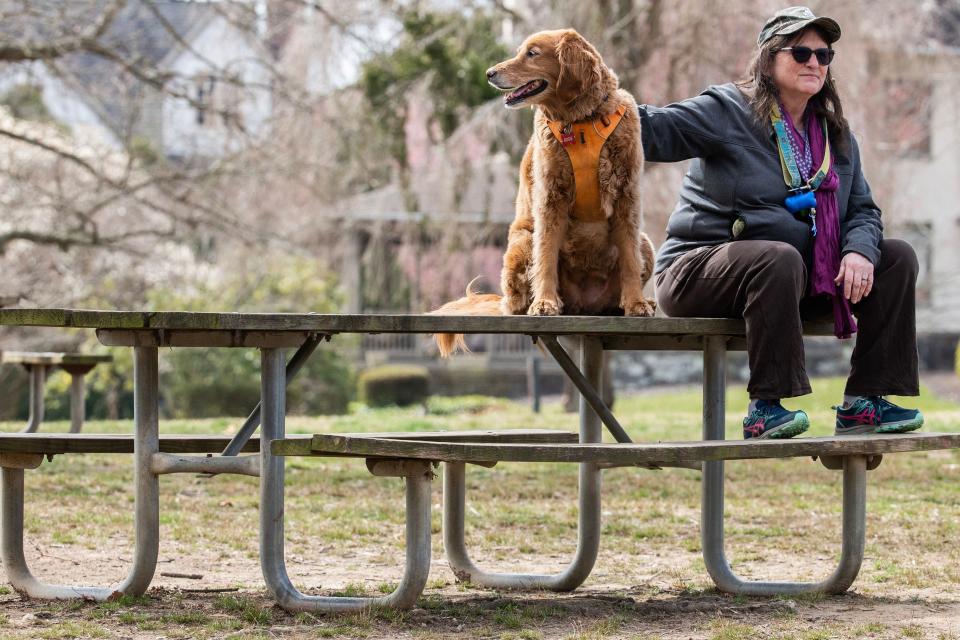
Indoor housing options must be adequately heated and cooled when necessary, with proper bedding provided. They must be properly ventilated with windows, vents, fans or air conditioning to minimize odors, drafts and moisture condensation, and have ample artificial or natural lighting.
The interior must be constructed for ease of cleaning and be impervious to moisture.
Dogs are not allowed to be confined outside and unattended during inclement weather, as issued by the National Weather Service, or other conditions that “pose a serious adverse risk to the health and safety of a dog,” the Delaware Code states, with “outside and unattended” defined as in the elements for longer than 15 minutes and outside of visual range and presence of the owner.
Even if a dog has access to an outdoor doghouse or similar structure, this is considered outside, unless the dog is actively engaged in the protection of livestock, farm property or poultry. These dogs have access to dry agricultural buildings like barns.
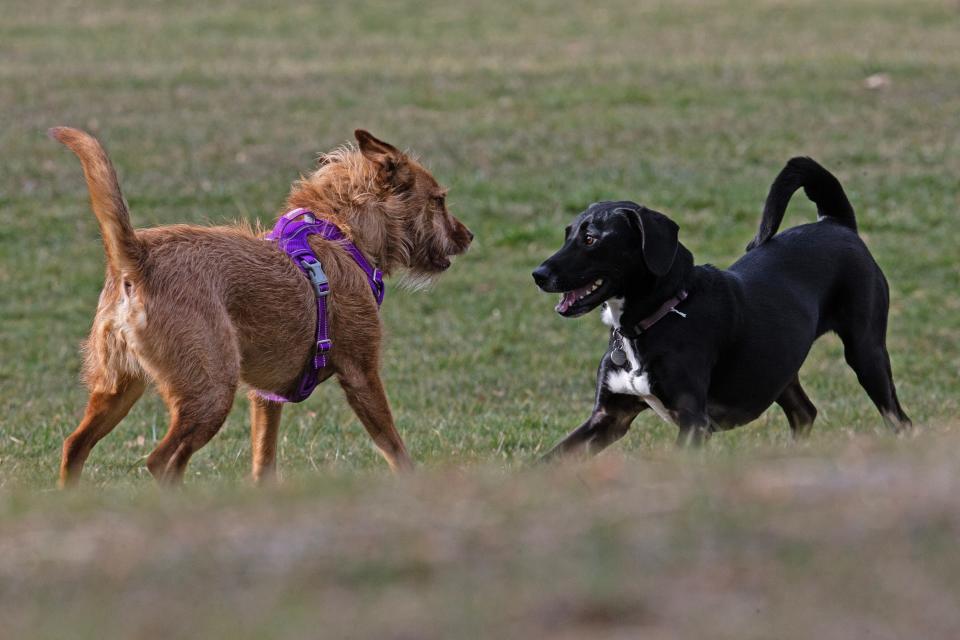
The shelter must protect them against inclement weather, allow them to remain dry during rain or snow and preserve their body heat. All structures must be made of a durable material and must have additional bedding material and a windbreak, such as a flap or tarp, at the entrance of the shelter between Nov. 1 and March 31 or when the temperature is 35 degrees or lower.
Each shelter must have at least one separate outside area that provides a shaded area for the dog to prevent itself from overheating or other heat-related discomfort.
Dog houses cannot be made from metal, mobile or traveling housing facilities, cars, refrigerators or freezers or similar structures. Housing facilities for dogs must have enough space for each dog to turn around freely, stand erect, sit and lie down in a “comfortable, normal position.” This generally is six inches or higher than the head of the tallest dog in an enclosure when in a standing position. Nursing puppies and their mothers should be granted additional space, according to the Delaware Code.
Food and water for dogs
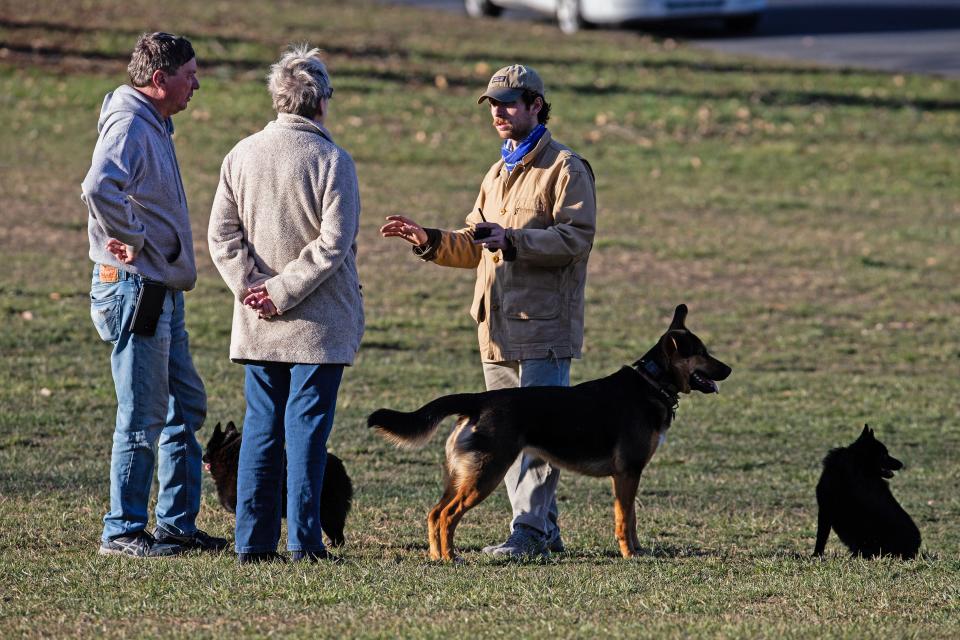
By law, dogs must be fed clean, nutritious food at least once a day or as required by a vet. Clean water should be readily available or offered as often as necessary and remain safe from contamination. Food receptacles should be sanitized regularly.
Multiple dogs in one enclosure
Delaware law requires dogs housed in the same primary enclosure to be compatible with the following restrictions:
Puppies 4 months old or younger may not be housed with adult dogs other than their parents.
Dogs cannot be housed in the same enclosure as other species unless they are compatible.
Female dogs in heat may not be housed in the same enclosure with males, except for breeding purposes.
Dogs exhibiting a vicious or overly aggressive disposition must be housed alone.
Dogs under quarantine or treatment for communicable diseases must be housed separately from other dogs and susceptible animal species to minimize the dissemination of the disease.
Anyone found violating the above guidelines related to housing and feeding dogs is subject to a civil penalty of $100 for a first violation in addition to costs, $250 in addition to costs for a second violation or $500 in addition to costs for each subsequent violation.
Dogs running at large
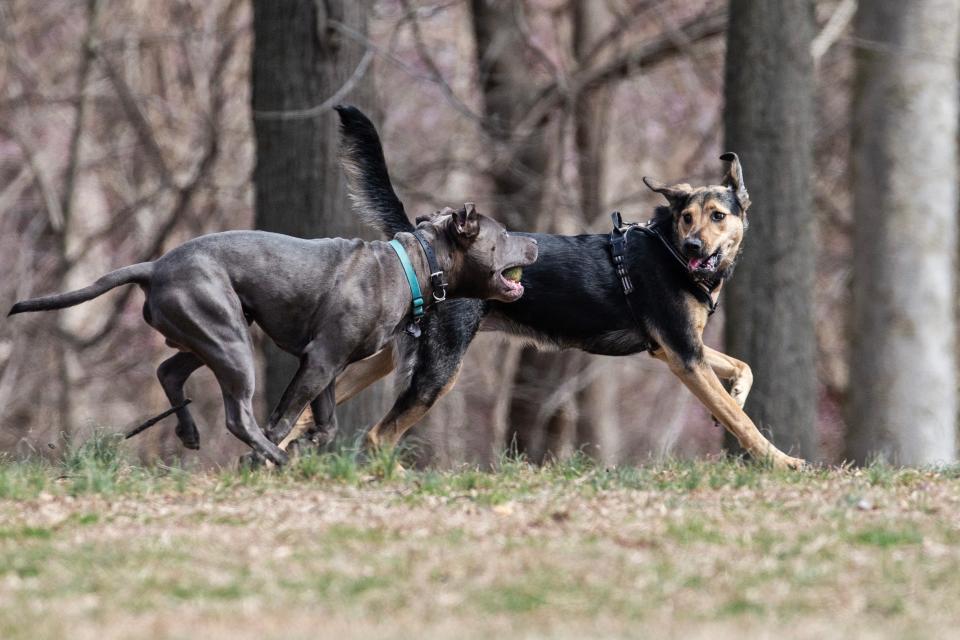
Dogs are not allowed to run off-leash outside at any time and must be secured with a proper leash fit for the dog’s size. A dog is not considered at large if it is on the owner’s property, on private property with permission or in a car.
Working dogs and dogs within designated off-leash dog parks are exempt from this rule and need only be at heel or under reasonable control of a person they are obedient to.
Dogs found running at large “may be impounded or disposed of” according to department rules and regulations. Impounded dogs cannot be “disposed of” without a five-day notification to the owner.
If you allow your dog to run at large, you can be fined between $25 and $50 for a first violation and between $50 and $100 for each subsequent offense occurring within 12 months of a prior offense.
There are increased fines for those who allow dogs in heat to run at large or if a dog at large bites a person.
Dogs at food establishments
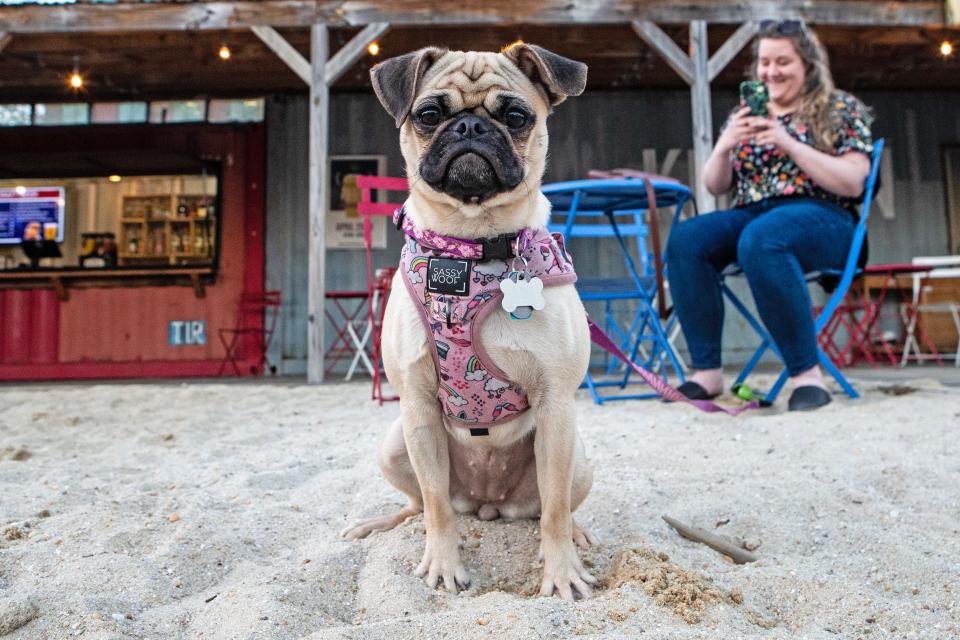
Dogs are allowed at Delaware food establishments and beer gardens with licensed outdoor patios. It is up to each establishment whether they want to allow dogs on the premises.
Liability of dog owners for damages
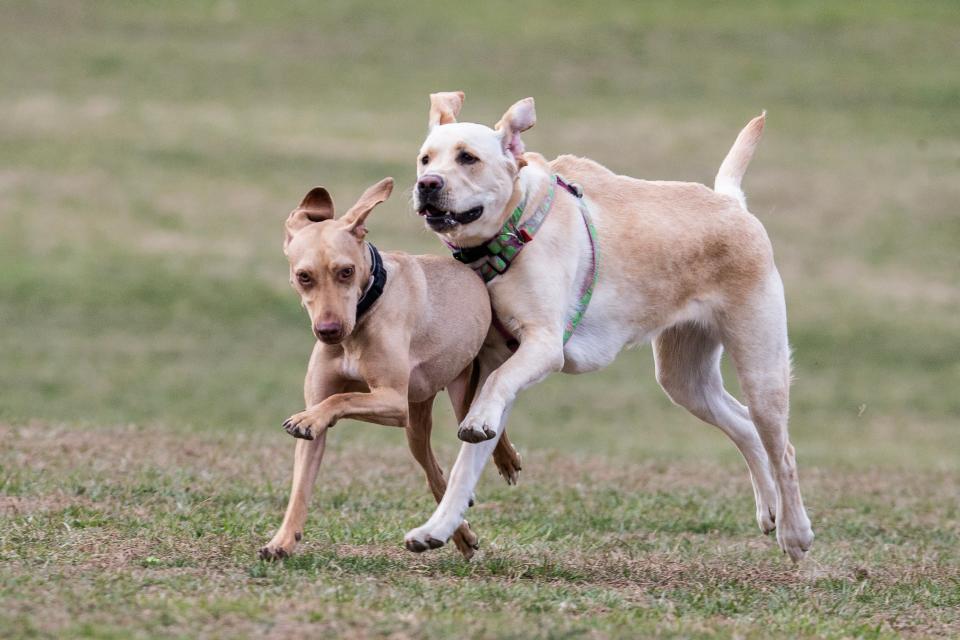
According to the Delaware Code, dog owners are liable for damages for an injury, death or loss to person or property that is caused by their dog, unless the incident was in response to a person committing or attempting to trespass or commit another criminal offense against the dog, the owner or their property.
Dogs are not allowed to injure, destroy or otherwise disturb any muskrat den, trap, lead, house, or any poultry or livestock.
Service dogs

Service dogs, defined as any guide dog, signal dog or other animally individually trained to do work or perform tasks for the benefit of an individual with a disability, have various protections under Delaware Law.
Anyone who intentionally interferes with a service dog is guilty of a class B misdemeanor.
If a service dog is intentionally injured or disabled, included officer K-9s, the offender is guilty of a class A misdemeanor.
If a service dog is intentionally killed, the offender is guilty of a class D misdemeanor.
If a service dog is intentionally stolen, the offender is guilty of a class E felony.
Got a tip or a story idea? Contact Krys'tal Griffin at [email protected].
Other Delaware dogs in the news
Forever home: This dog lived at a shelter for 942 days before being adopted. This is his story.
Play date with your dog: Celebrate the Dog Days with 8 dog-friendly places to bring your pup in Delaware
Dog abuse case: Couple arrested after 49 dogs were seized in Lewes and Rehoboth Beach
This article originally appeared on Delaware News Journal: Dog etiquette to follow, dog laws to know about in Delaware